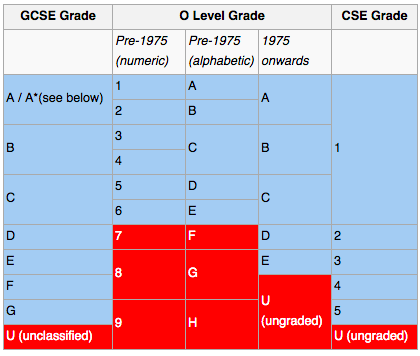카카오톡 상담 ID : Gcentre, Tel : 070 7010 3153, 이메일 : info@Gcentre.net
From Wikipedia, the free encyclopedia
The General Certificate of Secondary Education (GCSE) is an academic qualification awarded in a specified subject, generally taken in a number of subjects by pupils aged 14–16 in secondary education in England, Wales and Northern Ireland. One of the main changes to previous educational qualifications in the United Kingdom was to allow pupils to complete coursework during their two years of study, which was marked by their teachers and contributed to their final examination grade. There has been a move recently from doing coursework and modular examinations for part of the course when pupils would take exams throughout the course to an end of year exam after the two years of study. The exams are being revised to make them more difficult such as testing skills from a whole text in English instead of part of a text.
The qualification is equivalent to a Level 1 or Level 2 (grade depending) Key Skills Qualification (in Scotland, the equivalent is a National 5). Some pupils may decide to take one or more GCSEs before or after they sit the others, and people may apply to take GCSEs at any point either internally through an institution or externally.
The education systems of current and former British territories, such as Gibraltar, Nigeria and South Africa, also offer the qualification, as supplied by the same examination boards. The international version of the GCSE is the IGCSE, which can be taken anywhere in the world, and which includes additional options relating to coursework and the language the qualification is pursued in. Countries such as Zimbabwe still use the former O Level qualification.
Prior education to GCSE level is generally required of pupils wishing to pursue A Level courses or the BTEC Level 3 and International Baccalaureate. GCSE exams were introduced as the compulsory school-leavers' examinations in the 1980s by the government of the United Kingdom.
In secondary schools, GCSE courses are taken in a variety of subjects. Typically, study of chosen subjects begins at the start of Year 10 (ages 14–15). Some subjects start earlier, for example Maths, English and Science, because these courses are too long to be taught within 2 years. Final examinations are taken at the end of Year 11 (ages 15–16).
In Northern Ireland, these age groups are designated as one year group higher, so that Year 9 elsewhere is equivalent to Year 10 in Northern Ireland, and so forth. The number of subjects a pupil studies at GCSE level can vary. Usually somewhere between eight and ten subjects are studied, though it is not uncommon for more, or fewer, subjects to be studied.
In secondary schools, GCSEs are compulsory in the core subjects. The only requirement is that in state schools English, mathematics, science and physical education are studied during Key Stage 4 (the GCSE years of school). In England and Northern Ireland, pupils following the national curriculum (compulsory in state schools) must also study some form of information communication technology (ICT), and citizenship. In Wales, Welsh (as a first or second language) must also be studied. These subjects do not have to be taught for any examination (or even be discrete lessons), though it is normal for at least English, mathematics and science to be studied to GCSE level.
For the reasons above, virtually all pupils take GCSEs in English, mathematics and science. In addition, many schools also require that pupils take English literature, at least one modern foreign language, at least one design and technology subject, religious education (often a short, or 'half', course), and ICT (though increasingly this is the DiDA or OCR Nationals, rather than the GCSE). Pupils can then fill the remainder of their timetable (normally totalling ten different subjects) with their own choice of subjects (see list below). Short Course GCSEs (worth half a regular GCSE) or other qualifications, such as BTECs, can also be taken.
